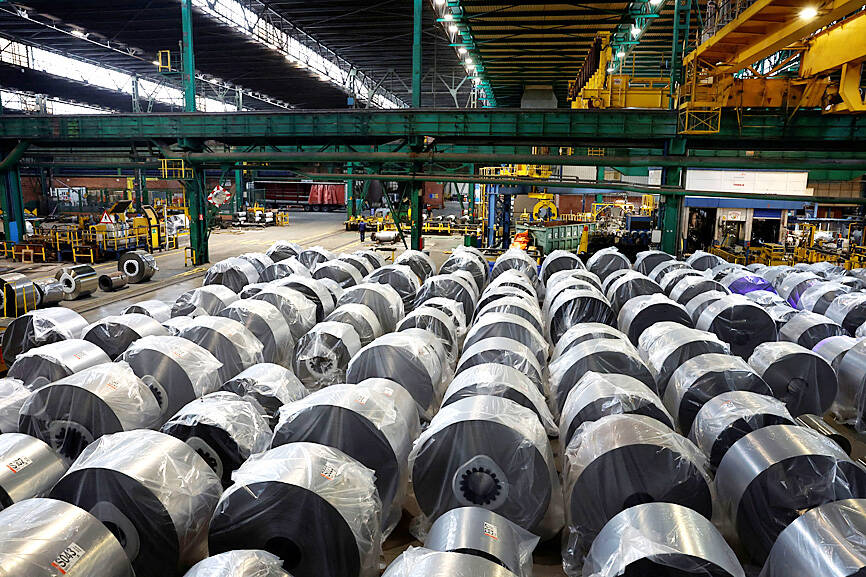China Steel Corp (CSC, 中鋼), Taiwan’s largest steelmaker, yesterday announced that it would keep domestic product prices unchanged for next month to help stabilize the market amid US President Donald Trump’s tariff threats.
The decision follows similar moves by China’s Baowu Steel Group Corp (寶武鋼鐵集), the world’s largest steelmaker, which said it would maintain prices for hot-rolled and cold-rolled plates, while Vietnam’s Formosa Ha Tinh Steel Corp (台塑河靜鋼鐵興業) raised prices for hot-rolled products by US$3 to US$5 per tonne, CSC said in a statement.
Hot-rolled plates are typically used in construction, such as house and bridge building, while cold-rolled steel plates are primarily used in vehicle manufacturing.

Photo: Reuters
Meanwhile, ArcelorMittal SA, Europe’s leading steelmaker, last month announced that it would raise prices for hot-rolled coils by US$22 per tonne, as iron ore and coking coal were persistently trading at high prices, the statement said.
“Considering the uncertain market sentiment for the impact of new US tariffs on our downstream industries, CSC is holding on prices for all products for May to stabilize the market sentiment,” CSC said.
Trump last month invoked Section 232 of the US Trade Expansion Act of 1962 to impose a 25 percent tariff on steel imports, citing national security concerns.
As a result, hot-rolled coil prices in the US have remained above US$1,000 per tonne, CSC said.
In addition, the US administration’s so-called “Liberation Day” 32 percent levy on Taiwanese goods — although postponed by 90 days — has also fueled uncertainty in the market, it added.
“Since some of our downstream customers are negatively affected by the uncertainty of US tariff policies, we will continue to pay attention to the latest developments and roll out support measures to help them secure orders,” CSC said.
If Trump’s 32 percent “reciprocal” tariffs remain in place over the long-term, Taiwan’s GDP growth could be reduced by at least 1.5 percent, putting downward pressure on the current 3.14 percent growth estimate released by the Directorate-General of Budget, Accounting and Statistics in late February, the company added.

STEEP DECLINE: Yesterday’s drop was the third-steepest in its history, the steepest being Monday’s drop in the wake of the tariff announcement on Wednesday last week Taiwanese stocks continued their heavy sell-off yesterday, as concerns over US tariffs and unwinding of leveraged bets weighed on the market. The benchmark TAIEX plunged 1,068.19 points, or 5.79 percent, to 17,391.76, notching the biggest drop among Asian peers as it hit a 15-month low. The decline came even after the government on late Tuesday authorized the NT$500 billion (US$15.2 billion) National Stabilization Fund (國安基金) to step in to buoy the market amid investors’ worries over tariffs imposed by US President Donald Trump. Yesterday’s decline was the third-steepest in its history, trailing only the declines of 2,065.87 points on Monday and

TAKING STOCK: A Taiwanese cookware firm in Vietnam urged customers to assess inventory or place orders early so shipments can reach the US while tariffs are paused Taiwanese businesses in Vietnam are exploring alternatives after the White House imposed a 46 percent import duty on Vietnamese goods, following US President Donald Trump’s announcement of “reciprocal” tariffs on the US’ trading partners. Lo Shih-liang (羅世良), chairman of Brico Industry Co (裕茂工業), a Taiwanese company that manufactures cast iron cookware and stove components in Vietnam, said that more than 40 percent of his business was tied to the US market, describing the constant US policy shifts as an emotional roller coaster. “I work during the day and stay up all night watching the news. I’ve been following US news until 3am

Six years ago, LVMH’s billionaire CEO Bernard Arnault and US President Donald Trump cut the blue ribbon on a factory in rural Texas that would make designer handbags for Louis Vuitton, one of the world’s best-known luxury brands. However, since the high-profile opening, the factory has faced a host of problems limiting production, 11 former Louis Vuitton employees said. The site has consistently ranked among the worst-performing for Louis Vuitton globally, “significantly” underperforming other facilities, said three former Louis Vuitton workers and a senior industry source, who cited internal rankings shared with staff. The plant’s problems — which have not

TARIFF CONCERNS: The chipmaker cited global uncertainty from US tariffs and a weakening economic outlook, but said its Singapore expansion remains on track Vanguard International Semiconductor Corp (世界先進), a foundry service provider specializing in producing power management and display driver chips, yesterday withdrew its full-year revenue projection of moderate growth for this year, as escalating US tariff tensions raised uncertainty and concern about a potential economic recession. The Hsinchu-based chipmaker in February said revenues this year would grow mildly from last year based on improving supply chain inventory levels and market demand. At the time, it also anticipated gradual quarter revenue growth. However, the US’ sweeping tariff policy has upended the industry’s supply chains and weakened economic prospects for the world economy, it said. “Now